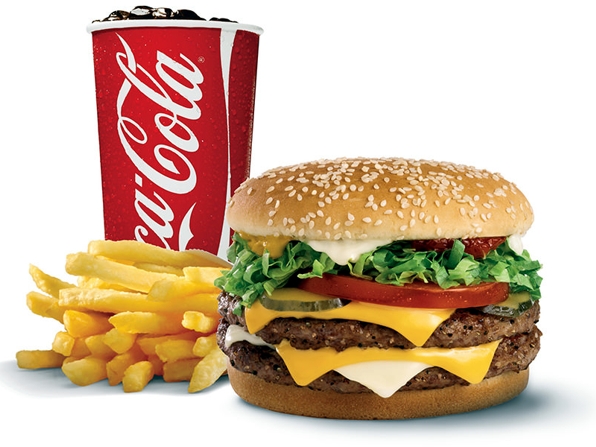We recently reported that the prevalence of ultra-processed food in the Western Diet is causing concern among nutritionists. Now, the first of what may turn out to be many such specific studies demonstrates that ultra-processed foods are bad for our heart health…
 Alas… Your basic Fast Food ‘convenience’ meal contains
Alas… Your basic Fast Food ‘convenience’ meal contains
a huge amount of ultra-processed foods..
Researchers at Northwestern University recently revealed that the U.S.’s (and, by association, the western world’s) Packaged Food supply – 80 percent of what most folks eat – is ‘ultra-processed’ and unhealthy. While that study was performed on a general, blanket level comparing common processed foods with the NOVA Food Classification System, developed at the University of Sao Paulo in Brazil, which defines ‘ultra-processed’ foods as, “… industrial formulations typically with five or more, and usually many ingredients. Such ingredients often include those also used in processed foods, such as sugar, oils, fats, salt, anti-oxidants, stabilisers, and preservatives. Ingredients only found in ultra-processed products include substances not commonly used in culinary preparations, and additives whose purpose is to imitate sensory qualities of [minimally processed or unprocessed] foods or of culinary preparations of these foods, or to disguise undesirable sensory qualities of the final product.”
What they did
Researchers at the U.S. Centers for Disease Control and Prevention (CDC) categorized foods into into groups by the extent and purpose of industrial processing they undergo. Ultra-processed foods include Soft Drinks, packaged Salty Snacks, Cookies, Cakes, Processed Meats, Chicken Nuggets, Powdered and Packaged Instant Soups, and many items often marketed as ‘convenience foods’.
Using data from the National Health and Nutrition Examination Survey (NHANES) collected between 2011 and 2016, researchers at the CDC reviewed the results from 13,446 adults 20 years of age and older, who completed a 24-hour dietary recall and answered questions about their cardiovascular health.
What they found
According top an abstract of the Study’s findings, “Researchers found that, for every 5 percent increase in calories from ultra-processed foods a person ate, there was a corresponding decrease in overall cardiovascular health. Adults who ate approximately 70 percent of their calories from ultra-processed foods were half as likely to have “ideal” cardiovascular health, as defined by the American Heart Associations’ Life’s Simple 7, compared with people who ate 40 percent or less of their calories from ultra-processed foods.”
Cardiovascular health is defined by Life’s Simple 7 as measures of healthy blood pressure, cholesterol and blood glucose levels, avoidance of tobacco products, good nutrition, healthy body weight and adequate physical activity.
The takeaway
“Healthy diets play an important role in maintaining a healthy heart and blood vessels,” said Dr. Zefeng Zhang, an epidemiologist at the CDC. “Eating ultra-processed foods often displaces healthier foods that are rich in nutrients, like fruit, vegetables, whole grains and lean protein, which are strongly linked to good heart health. In addition, ultra-processed foods are often high in salt, added sugars, saturated fat and other substances associated with increasing the risk of heart disease.”
“This study underscores the importance of building a healthier diet by eliminating foods such as sugar-sweetened beverages, cookies, cakes and other processed foods,” said Dr. Donna Arnett, Past-President of the American Heart Association. “There are things you can do every day to improve your health just a little bit. For example, instead of grabbing that loaf of white bread, grab a loaf of bread that’s whole grain or wheat bread. Try replacing a hamburger with fish once or twice a week. Making small changes can add up to better heart health.”
My take
Well, like most great discoveries in science and health, the study’s quantified results come as no surprise. Well, to me, anyway. I’ve often said that, if one must err in calculations concerning their health and welfare, they should err on the side of common sense. And I’m pleased that we now have some firm numbers on how bad processed foods really are for us. Maybe, at last, these results will shut up at least some of the nay-sayers, who claim processed foods are just fine, and who consume them immoderately.
~ Maggie J.

